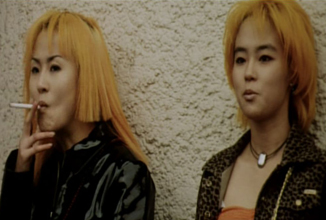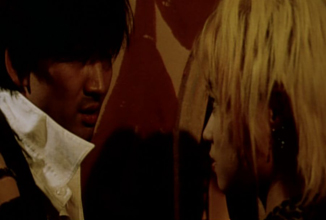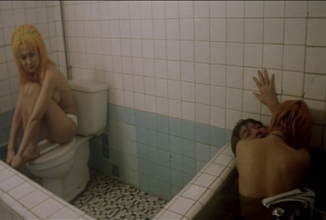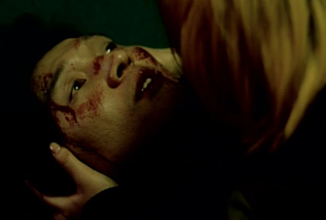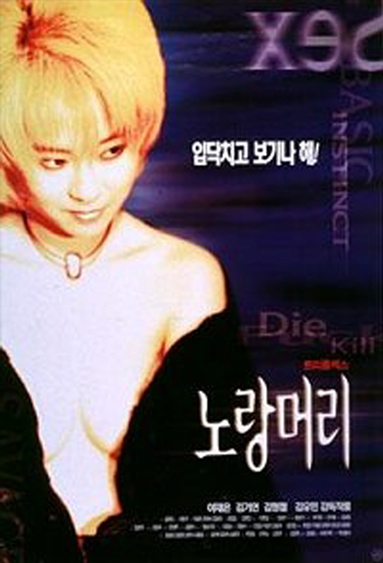"You know, dying our hair was my idea... Yu-na looks so beautiful like that..."
Synopsis:
Yu-na (Lee Jae-eun) and Seong-ji (Kim Ki-yeon) are the closest of female friends who have decided to shun normal life and the morals of society in the pursuit of pleasure, dying their hair bright yellow in the process.
On a night out dancing, they meet Yong-kway (Kim Hyeong-cheol) and no sooner have they invited him back to where they live than Yu-na begins a passionate sexual relationship with him.
As the two new lovers' constant need for sex inadvertently begins to push Seong-ji away, she takes it upon herself to have sex with Yong-kway too, but with the discovery that he has also become involved in a relationship with a former female work colleague, Yu-na and Seong-ji decide that drastic measures are required...
Review:
Yellow Hair was the first film to be banned in Korea by the Korean Performing Arts Promotion Committee, with its subsequent release only being allowed with a darkening and blurring of some of the sexual imagery. Not only that, but various accusations were also leveled at Yellow Hair at the time (described by the aforementioned Korean Performing Arts Promotion Committee as containing “scenes which are disgusting and totally unacceptable to our moral standards”), and the controversy that quickly became part and parcel of almost any mention whatsoever of Yellow Hair might lead some to expect a discussion here of whether the film is, in truth, erotic art or simply pornography masquerading as such.
However, as the level of graphic sexual explicitness in the visuals is certainly no greater than can be found in more than one '18' certificate Korean films released around the same time (Happy End, 1999, coming immediately to mind), it is far more likely that the banning of the film was largely as a result of the context within which that adult content appears, rather than because of the amount/strength of nudity present alone.
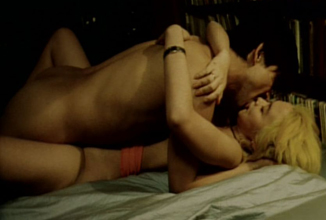 |
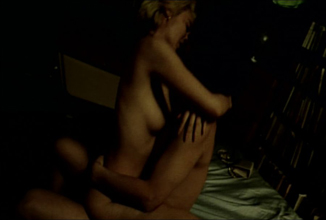 |
From the very outset of Yellow Hair, it is clear that both Yu-na and Seong-ji have made the conscious decision to run away from 'normal' life (and family) within Korean society - in the overdubbed dialogue from Yu-na to Seong-ji (and vice versa) at the very beginning of the film, Yu-na asks "Where are you, Seong-ji? Have you gone home, back to that hell?” - and for the majority of the running time they survive perfectly well outside of the norm, their pursuit of pleasure seeming to only adversely affect other individuals who conform to society's expectations.
Add to that the fact that Yu-na is pregnant from a previous sexual relationship with an unnamed man, subsequently having an illegal abortion; Yu-na and Seong-ji both end up having sexual intercourse, as well as oral sex, with Yong-kway; and the obvious sexual attraction the two women have for each other (culminating in Yu-na and Seong-ji having passionate sex together), and, even though it’s made clear that there are ultimately consequences to Yu-na and Seong-ji’s choices and actions, it’s nonetheless not difficult to see why the Korean Performing Arts Promotion Committee had such a hard time accepting the repeated nudity and sexual scenes within a narrative containing so many anti-establishment elements.
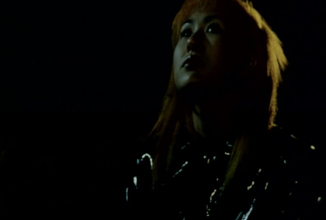 |
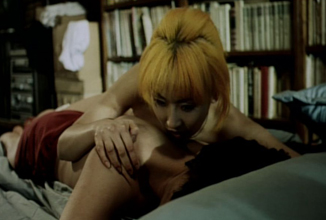 |
The heralding of each successive plot 'chapter' with Yu-na's bitter song lyrics written on her computer (successively becoming more violent in tone, often concluded with the phrase "Burn it. Kill it."), may be a rather obvious ploy to foreshadow the darkening of proceedings rather than allowing the story to build naturally on its own - even though it's fairly obvious where the story is headed anyway - but the words Yu-na writes do nonetheless also serve as somewhat of a window into her mind as it pushes her to ever angrier and more desperate actions to get what she wants and protect the things that are important to her, as well as allowing a glimpse at the world from her increasingly twisted perspective.
Add in the underlying reason behind Seong-ji's willingness to go along with whatever Yu-na wants despite, early on, appearing to be somewhat a voice of reason and consolation, and a tangled web can hardly fail to be weaved.
Behind all the sex and violence, Yu-na and Seong-ji are ultimately both striving for the very things found in the normal lives they've been so desperate to escape: Love, trust, loyalty and understanding.
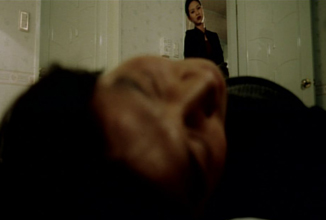 |
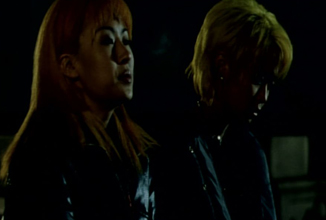 |
Cinematically, Yellow Hair strives to visually emulate the dark grittiness of the narrative itself, and is awash throughout with tones reminiscent of the hair colours of Yu-na and Seong-ji, especially during the numerous sexual scenes. This, in itself, repeatedly gives an almost unreal, dream-like (or nightmare-like, if you prefer) quality to the increasingly twisted proceedings and largely feels like the visual equivalent of the narrative glimpses into Yu-na's mind - with each adding to the effectiveness and believability of the other.
The pace is brisk throughout, but never feels forced or rushed, and as the story continues to darken, the regular use of close-up and extremely intimate camera work deftly changes the overall feeling from sensual and erotic, in the early stages, to deeply claustrophobic, as the conclusion draws near.
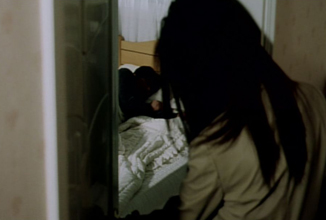 |
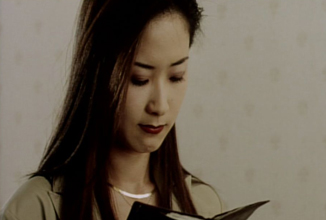 |
Summary:
While Yellow Hair could never be described as subtle, and though its narrative depth is less involved than it could perhaps have been, this dark and twisted tale is nonetheless far more worthy of merit and discussion than the description "adult thriller" would suggest.
Cast (Actor… Character)
Lee Jae-eun… Yu-na
Kim Ki-yeon… Seong-ji
Kim Hyeong-cheol… Yong-kwak
DVD
The DVD edition reviewed here is the (Region ALL) Tai Seng Entertainment single disc edition, which comes in a standard Amaray case inside deluxe packaging. The film itself is provided as an anamorphic transfer with an aspect ratio of 1.85:1 and there are no image artifacts (and no ghosting) present. The picture is rather grainy but that is clearly down to the original visuals rather than being a transfer issue, and it should be noted that the picture quality actually serves to accentuate the gritty realism of the storyline.
The original Korean language soundtrack is provided as a choice of Dolby Digital 5.1 and Dolby Digital 2.0 (Cantonese and Mardarin subbed audio are available as well) and is well balanced throughout.
Excellent subtitles are provided throughout the main feature. There are, however, no DVD Extras available with this release.
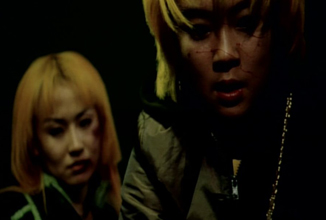 |
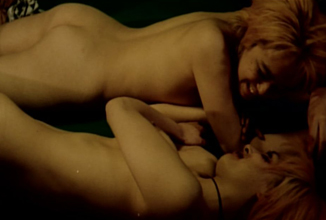 |
DVD Details:
• Director: Kim Yoo-min
• Format: NTSC, Anamorphic, Widescreen, Subtitled
• Language: Korean/Cantonese/Mandarin
• Subtitles: English/Chinese/None
• Sound: Dolby Digital 5.1, Dolby 2.0
• Region: Region ALL
• Aspect Ratio: 1.85:1
• Number of discs: 1
• Studio: Tai Seng Entertainment
• Run Time: 82 minutes (approx.)
|


